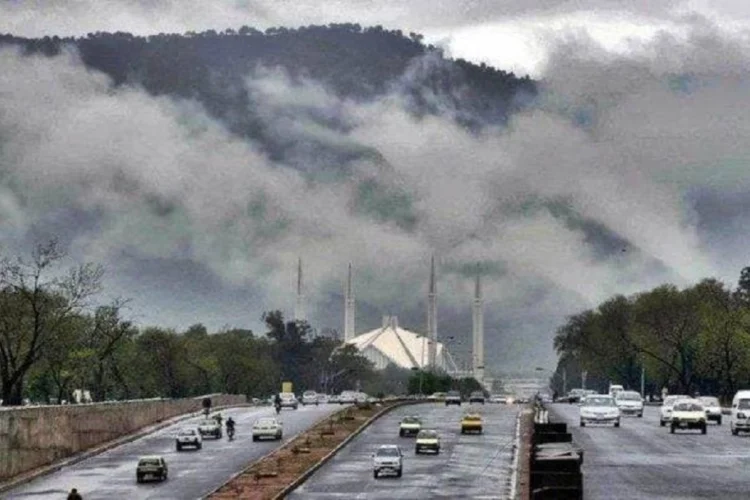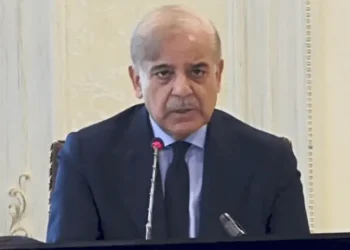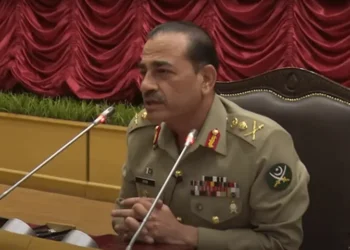ISLAMABAD (Web-Desk); Heavy rainfall early Wednesday morning battered the twin cities of Islamabad and Rawalpindi, mirroring the wet conditions seen across much of the country. While the downpour brought a welcome drop in temperature, it also triggered urban flooding in several low-lying areas, disrupting daily life and resulting in multiple tragic incidents.
Flash Flooding Claims Lives in Islamabad
In Islamabad, torrential rain on Tuesday morning led to flash floods in various areas, sweeping away four individuals in separate incidents. One of the most tragic cases occurred within the jurisdiction of Sihala Police Station, where a retired army officer, Colonel Ishaq Qazi, and his 25-year-old daughter were swept away by floodwaters while driving through Phase 5 of a housing society. They were reportedly on their way out when their car was overtaken by a sudden surge of water from a nullah.
Rescue teams, including divers, were quickly dispatched and stationed along the banks of the River Soan—where the nullah drains—in an attempt to locate the victims. Despite a ten-hour operation, poor visibility and strong currents forced authorities to call off the search after nightfall. As of the latest reports, their bodies had not yet been recovered.
In another incident, 17-year-old Hammad Shah drowned after slipping into a flooded nullah in the Humak area. His body was later retrieved from the River Soan. Meanwhile, in Khanna, an eight-year-old girl named Anya went missing after falling into the Korang nullah. She had reportedly slipped while walking alongside the nullah during the rain. A search operation is underway, but she remains unaccounted for.
Rawalpindi Braces for More Rain
Rawalpindi also witnessed heavy rainfall that began in the early hours and persisted until the afternoon. The rainfall inundated several neighborhoods, with water rising up to 10 feet in the Leh Nullah at Kattarian Bridge and seven feet at Gawalmandi Bridge. While this level did not reach the official flood threshold of 22 feet, authorities declared a pre-alert to prepare for possible flooding.
In response, the Pakistan Army, Water and Sanitation Agency (WASA), Rescue 1122, and other civic departments were deployed to monitor the situation closely. Deputy Commissioner Rawalpindi Dr. Hassan Waqar Cheema confirmed that despite receiving up to 85mm of rain in certain areas, the overall situation remained under control. WASA was actively draining water from affected roads and streets using heavy machinery.
Low-lying areas such as Saddar, Murree Road, Sadiqabad, Kutchery Chowk, Tench Bhatta, Peshawar Road, and Jamia Masjid Road experienced severe water accumulation, forcing residents to spend hours clearing water from their homes. In one incident, the shed of a building near Kamran Market in Saddar collapsed partially due to the rain, while in another, a house in Lalazar-2 was flooded, injuring one person who was later rescued.
A motorcyclist also fell into a nullah along Dhamial Road but was quickly rescued and transferred to Rawalpindi Teaching Hospital. In multiple areas, electricity supply was suspended as a precaution and later restored in localities along Leh Nullah.
Rainfall Measurement and Forecast
The Meteorological Department reported varied rainfall figures: 101mm in Saidpur, 78mm in Golra, 35mm at Zero Point, 68mm in Bokra, and 24mm at Islamabad International Airport. In Rawalpindi, Katcheri received 85mm, Gawalmandi 35mm, Shamsabad and Pirwadhai 32mm, and New Kattarian 27mm. The department has forecast more rainfall over the next 48 hours.
Weather Systems and Risk Outlook
According to a Met Office spokesperson, a seasonal low-pressure system over northern Balochistan, coupled with moist currents from the Arabian Sea and a westerly wave, is driving the current weather pattern. The spokesperson warned of continued rainfall accompanied by thunderstorms across Islamabad, Punjab, Khyber Pakhtunkhwa, Gilgit-Baltistan, northeast Balochistan, and Kashmir.
Heavy downpours could lead to flash floods in streams and nullahs in Chitral, Swat, Mansehra, Shangla, Abbottabad, and other northern districts. Urban flooding is also a significant risk in cities like Islamabad, Rawalpindi, Gujranwala, Lahore, Sialkot, Faisalabad, and Peshawar.
Authorities have urged residents to remain vigilant, avoid unnecessary travel during storms, and stay clear of water channels and nullahs. With more rain forecasted, emergency services remain on high alert to respond to any developing situations.





































































